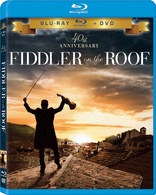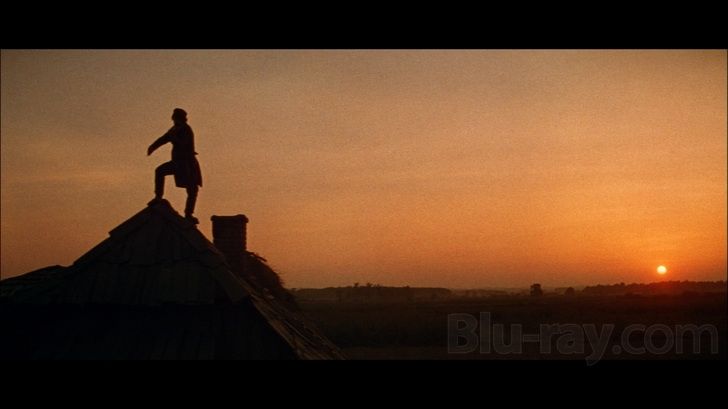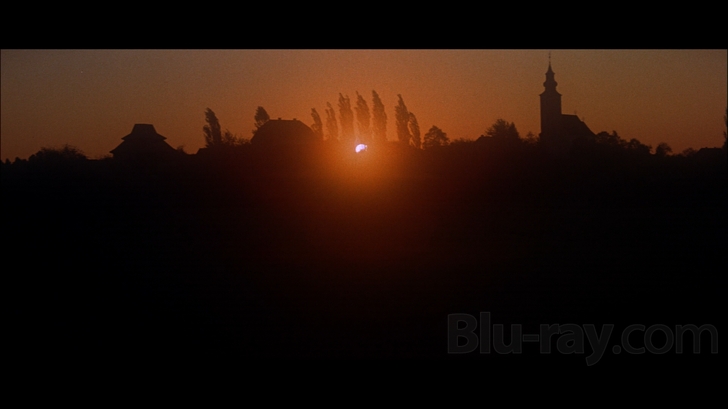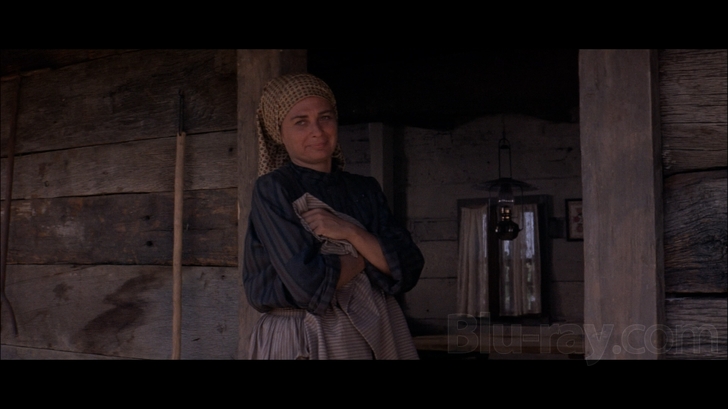Fiddler on the Roof Blu-ray Movie
HomeFiddler on the Roof Blu-ray Movie 
40th Anniversary Edition / Blu-ray + DVDMetro-Goldwyn-Mayer | 1971 | 181 min | Rated G | Apr 05, 2011

Movie rating
8.1 | / 10 |
Blu-ray rating
| Users | 4.5 | |
| Reviewer | 4.5 | |
| Overall | 4.5 |
Overview
Fiddler on the Roof (1971)
Film version of the stage musical, based on the stories of Sholom Aleichem. Tevye the Milkman is a Jewish peasant in pre-Revolutionary Russia, coping with the day-to-day problems of 'shtetl' life, his Jewish traditions, his family (wife and daughters), and state-sanctioned pogroms.
Starring: Topol, Norma Crane, Leonard Frey, Molly Picon, Paul Mann (I)Director: Norman Jewison
| Romance | Uncertain |
| Family | Uncertain |
| Musical | Uncertain |
| Drama | Uncertain |
Specifications
Video
Video codec: MPEG-4 AVC
Video resolution: 1080p
Aspect ratio: 2.34:1
Original aspect ratio: 2.39:1
Audio
English: DTS-HD Master Audio 7.1 (48kHz, 24-bit)
French: DTS 5.1
Italian: DTS 5.1
German: DTS 5.1
Spanish: Dolby Digital Mono
Portuguese: Dolby Digital Mono
Spanish: DTS 5.1
Subtitles
English SDH, French, Spanish, Portuguese, Japanese, German, Danish, Dutch, Finnish, Greek, Hebrew, Hungarian, Italian, Norwegian, Swedish
Discs
50GB Blu-ray Disc
Two-disc set (1 BD, 1 DVD)
DVD copy
Packaging
Slipcover in original pressing
Playback
Region free
Review
Rating summary
| Movie | 4.5 | |
| Video | 4.5 | |
| Audio | 4.5 | |
| Extras | 4.0 | |
| Overall | 4.5 |
Fiddler on the Roof Blu-ray Movie Review
A classic, right? Of course right!
Reviewed by Jeffrey Kauffman April 5, 2011There was a time when a Broadway musical smash was pretty much guaranteed a transfer to film, even if often the film versions were radically tweaked, which sometimes included removing the songs altogether (Fanny, Irma La Douce). But for virtually two uninterrupted decades, one huge Broadway hit after another came to the screen, often to rapturous reviews and adoring box office. Accompanying those adaptations were original film musical fare, many of which managed to do respectable if not overwhelming business. But the writing was squarely on the ticket taker’s wall by the end of the 1960’s. While there were certainly occasional exceptions (strangely enough two Columbia releases, Funny Girl and Oliver!), a slew of big budget outright flops or at the very least major financial disappointments of both genres—originals and adaptations—had tanked at the box office, in some cases coming close to sinking their studios. For Fox, it was the twin debacles of Doctor Dolittle and Star!, followed by the less than spectacularly received Hello, Dolly!. For Universal it was Sweet Charity (still in many ways my favorite musical from this era). For Paramount it was Paint Your Wagon and On a Clear Day You Can See Forever. For Warner it was Camelot and Finian's Rainbow. The musical version of Goodbye, Mr. Chips proved to be disastrous for MGM. Aside from the iffy Chitty Chitty Bang Bang, United Artists managed to stay out of this dangerous fray by simply not releasing any behemoth musicals during the end of this Golden Era (though the studio hadn’t exactly released any barn burners with its smaller scale film versions of A Funny Thing Happened on the Way to the Forum and How to Succeed in Business Without Really Trying, two musicals which probably had more words in their titles than people in their audiences most showings). But there may have been some very nervous bean counters as the 1970’s dawned and United Artists prepared to release what was one of the biggest musical productions in years, Fiddler on the Roof.

New York City obviously has a huge Jewish population, and so the idea of musicalizing Sholem Aleichem’s beautiful but often haunting folktale-like stories probably seemed like something close to a sure bet, but upon further examination it was a fairly risky proposition to bring Fiddler to the Roof to the Great White Way in 1964. First of all, shows catering exclusively (or at least mostly) to Jews hadn’t fared especially well, with such musicals as Jerry Herman’s Milk and Honey eking out a season or two at most on the boards. Furthermore, the songwriters assigned to Fiddler on the Roof, had just come off one of the more disappointing flops of recent seasons, the charming but sadly short-lived She Loves Me, a musicalization of the wonderful Lubitsch film The Shop Around the Corner. Bock and Harnick had had some fair degree of success previously to She Loves Me, both together (their Pulitzer Prize winning Fiorello!) and separately, but they weren’t quite in the Rodgers and Hammerstein or Lerner and Loewe league yet. And producer-director Harold Prince was also exorcizing a few ghosts of his own. He had produced and directed the aforementioned She Loves Me, and while his producing credentials were top notch, his only other experience directing a musical was an even bigger flop than She Loves Me, the extremely short-lived A Family Affair. Though Prince would quickly become a directorial force to be reckoned with, based largely on the success of Fiddler itself, as well as Cabaret and his iconic collaborations with Stephen Sondheim, he hadn’t quite yet become the impresario he would. And yet there was undeniable magic in the air when Zero Mostel strutted and bellowed his way through the evening as Tevye, the milkman with daughters with one thing on their mind: marriage.
Norman Jewison seems like a rather odd choice to helm a project as gargantuan as Fiddler on the Roof. The original musical approached, and then became, the longest running show (up to that time) in Broadway history as the film was in production, and the anticipation for a big screen adaptation was palpable, certainly something quite unusual in the early 1970’s. Jewison had made his career both with frothy, lightweight comedies (The Thrill of it All, The Russians are Coming, The Russians are Coming) and a few heavier dramas (In the Heat of the Night), but nothing in his oeuvre suggested he was ready to marshal the directorial forces necessary to bring such a huge project—and one with so many built in expectations—to the screen. Perhaps amazingly, Jewison turned out to be perfectly suited to capture both the visual grandeur a big screen adaptation could afford the musical, but also to guide a number of extremely well modulated performances from a cast that included names relatively unknown to American audiences (star Topol, who had played Tevye in the West End run of Fiddler) to future stars (Starsky and Hutch’s Paul Michael Glaser, billed here without the “Paul”) to icons of the Yiddish stage (Molly Picon, who had in fact starred in Herman’s Milk and Honey after a long and legendary career in films and theater).
Jewison’s incredibly filmic approach to this material becomes completely evident from the first sequence, the inimitable “Tradition.” Notice how Jewison and his editors Antony Gibbs and Robert Lawrence brilliantly cut between the contrasting groups in Anatevka, as well as Tevye, all perfectly timed to John Williams’ Oscar winning adaptation of the brilliant Bock-Harnick score. With Oswald Morris’ Academy Award winning cinematography, which Jewison joked was shot through a silk stocking when he picked up the Oscar for Morris, Fiddler establishes itself from its first moments as one of the most impressively visual experiences in the entire canon of musical films.
Fiddler, though, rises or falls on the strength of its performances, notably Tevye, who in the wrong hands can become a parody of Aleichem's original conception. In fact the blustery Zero Mostel often lapsed into schtick during his long Broadway run as the harried milkman, but his hyperbolic approach actually endeared him to theatergoers, and there was a hue and cry, perhaps not quite at the Julie Andrews My Fair Lady level, when he wasn't selected to play the part for the film, especially when the typical reason for not selecting a Broadway star, i.e., name recognition, certainly couldn't be claimed by one Chaim Topol. But Topol gives a deliberately smaller scale performance as Tevye, one perfectly suited for the medium of film. Topol does of course occasionally play things to the rafters, but more usually he's a more natural Tevye than Mostel was, giving a heartfelt and beautifully nuanced performance that anchors the film version of Fiddler in something at least approaching realism.
In fact it’s that air of realism which gives Fiddler on the Roof its undeniable emotional edge. Despite the unusual technique of Tevye repeatedly breaking the filmic fourth wall and directly addressing the audience, this musical is firmly grounded in at least its own reality in a way few tuners ever have been. And even more compelling is that this story, though obviously largely Jewish in scope and reference, manages to become completely universal, speaking to the hearts of anyone who has seen traditions crumble by the wayside, lives change, hometowns dissolve, and tyrannies both large and small rear their ugly heads. Fiddler’s great achievement is that it deals with some huge issues within the framework of one rural Jewish family in the Eastern European town of Anatevka. And it does so largely flawlessly in this film adaptation, which original book writer Joseph Stein adapted to the screen with some really smart changes. Though a couple of songs are missing, this is one of the most faithful adaptations of a Broadway musical ever to hit the big screen, but it’s also one of the few musicals which completely takes advantage of the many opportunities filming offers.
Aside from the stupendous production design of Robert Boyle and the evocative costumes of Joan Bridge and Elizabeth Haffenden, the film benefits immensely from yet another fantastic job of music adaptation by John Williams, who in fact won his first Oscar for his work here. Williams had already made his mark scoring many a television show from the 1960’s and had moved on to some stellar film work, including the aforementioned 1969 musical version of Goodbye, Mr. Chips, for which he was nominated for an Academy Award (try to get the brilliant three CD release of the Leslie Bricusse penned soundtrack by Film Score Monthly to hear Williams’ incredible orchestrations and arranging on the film, which is unfairly branded as having a lackluster score). But it was with Fiddler that Williams really seemed to come into his own, at least with regard to musical motion pictures. Providing everything from a virtuoso violin cadenza (played by Isaac Stern) which opens to film to some charming opening up of the Broadway version’s original orchestrations (Alexander Courage of Star Trek fame also contributed his expertise to the orchestrations), Williams brings a sense of flash and panache to the film, while always keeping the underlying melancholy which has been such a large part of the score’s allure.
But Jewison himself is probably most deserving of credit in terms of very smartly adapting the source material to the medium of film. Though he and Morris are a bit too fond of the then-popular zoom lenses, Jewison again and again provides a sense of balance and structure to his piece and manages to recast the original musical’s overt theatricality into a more common sense filmic approach. Such repeated moments as Tevye’s Talmudic dialogues (“On the one hand. . .”) are reinvented for the screen version with quite a bit of aplomb. As Tevye delves deeper into his internal dialectic, whomever he is discussing is suddenly seen from a distance, until he is finally able to make a decision and the original close juxtaposition of characters is reestablished. It’s as overtly filmic as anything in the original play was theatrical, but it also works brilliantly and never distracts or breaks the film’s intrinsic continuity.
In a very real way, the film of Fiddler on the Roof signaled the end of a Hollywood tradition. This was one of the last big roadshow musical features, large scale productions with intermissions, programs, and “exclusive, reserved seat” presentations. Like Tevye himself, we musical lovers have all had to adjust to the changing times and try to accept that things will never be the same. At least with this wonderful new Blu-ray, we can revisit Fiddler anytime we want, creating a new tradition of our own, and enjoy the film which looks and sounds better than it has probably since its original theatrical exhibition.
Fiddler on the Roof Blu-ray Movie, Video Quality 

There may be some misguided comments about how soft Fiddler on the Roof's AVC encoded 1080p 2.34:1 transfer looks, most likely from people who never saw the film theatrically to begin with. As Jewison commented himself when he accepted Oswald Morris' Academy Award for cinematography, the film does in fact look like it was photographed through a silk stocking. Images are diffused and at times slightly surreal looking. But that's the way this film looked originally. This is a stellar transfer which offers excellent color (though the first few minutes after the Entr'acte are just a tad pallid compared to the rest of the film), exceptional clarity and very pleasing fine detail. There are a few blemishes and flecks which dot the film from time to time, and you'll notice some problematic flicker in the opening few moments. While there is some very moderate edge enhancement on display, grain is intact and the film retains a very natural and nicely textured appearance. Overall, this is a remarkably faithful presentation and one which should easily delight lovers of this film and its very evocative look.
Fiddler on the Roof Blu-ray Movie, Audio Quality 

Fiddler on the Roof has been granted a brand spanking new lossless DTS-HD Master Audio 7.1 mix for this Blu-ray release, and the results are largely spectacular. The Bock-Harnick score rings from the speakers with a freshness and vitality that will astound a lot of listeners, and Williams' brilliant work is fully on display in the warm and lustrous tones of the strings, which he utilizes so effectively through the film, both in solo and ensemble moments. Various sound effects are very smartly placed around the soundfield, something astute listeners will notice right off the bat with the preternaturally quiet opening of the film, which slowly builds environmental sounds before Tevye's entrance. Dialogue is clean and crisp and also very well positioned. Fidelity is very good, and in fact is too good a couple of times, by which I mean distortion within the original stems is readily discernable. Listen for example to Michele Marsh's dialogue right before "Matchmaker" starts for a good indication of what I'm talking about; it's nothing horribly egregious, but just the slightest bit of fuzziness creeps through. The film's generous use of post-dubbing is also a bit more firmly on display than it has been in previous home theater iterations, with clearly audible differences in levels and ambient hall effects in some of the looped moments. Overall, though, this is a thrillingly effective soundtrack that preserves and enhances one of the glories of that era's scores.
Fiddler on the Roof Blu-ray Movie, Special Features and Extras 

- Commentary by Jewison and Topol was obviously recorded separately, but is well edited and provides a wonderful glut of information about the background of the piece, as well as the filming which took place largely in Yugoslavia.
- Norman Jewison Filmmaker (SD; 49:33) is a vintage featurette from the time of the film's production and looks at some of the challenges of filming on location in a foreign country.
- Norman Jewison Looks Back is a set of shorter snippets devoted to various subjects. These include On Directing (SD; 3:28) where Jewison recounts how he got the Fiddler assignment; Strongest Memory (SD; 00:57) where Jewison talks about the people of Yugoslavia; Biggest Challenge (SD; 1:11), devoted to the ever changing weather; On Casting (SD; 1:20) an interesting dissertation on why Zero Mostel would have never worked for the film version; and A Classic? (SD; 2:34), where Jewison talks about the universality of Fiddler's themes despite its Jewish focus.
- Tevye's Dream in Color (SD; 5:56), with Jewison introduction, presents the sequence, which is presented largely desaturated in the final film version, in its original version. There's quite a bit of print damage up front, but it gets better.
- Side By Side Comparison (SD; 1:39) offers a split screen look at the dream sequence, sliced into desaturated and original color halves.
- John Williams: Creating a Musical Tradition (SD; 11:32) focuses on the iconic composer, who acted as adapter, conductor and co-orchestrator of the film version of Fiddler.
- Songs of Fiddler on the Roof (SD; 14:43) is a really interesting amalgamation of interviews with original collaborators Joseph Stein, Jerry Bock and Sheldon Harnick.
- Deleted Song: Any Day Now (SD; 3:07). No, not the Bacharach-David classic, but a song which was meant to introduce Perchik. It's presented here via a Bock demo (replete with orchestra), set to clips and stills from the film.
- Tevye's Daughters (SD; 16:28) is a nice retrospective featuring the three actresses who played Tevye's eldest girls. Rosalind Harris, Michele Marsh and Neva Small are all interviewed and remember what it was like to be cast and then work on the film.
- Set in Reality: Production Design (SD; 9:50) looks at the incredible production design of Robert Boyle.
- Storyboard to Film Comparison (SD; 21:04) features several musical sequences.
- Trailers, Teasers and TV Spots
- Standard Definition DVD copy of the film
Fiddler on the Roof Blu-ray Movie, Overall Score and Recommendation 

If you don't have a lump in your throat by the end of Fiddler in the Roof, you might want to get to a coronary specialist to make sure you still have a heart. This beautifully tender and simultaneously hilariously raucous musical is a loving testament to the power of family in the face of change and hugely sweeping societal forces. Graced by one of the most iconic scores of the 1960's, lovingly adapted by John Williams, and delivered to film with some very smart choices by director Norman Jewison, Fiddler on the Roof has lost none of its immediacy nor indeed its relevance. This new Blu-ray offers excellent image and audio quality and should excite even those who normally are immune to the charms of film musicals. Very highly recommended.
Similar titles
Similar titles you might also like

The Music Man
1962

The King and I
1956

My Fair Lady 4K
BD is Bonus Features
1964

The Sound of Music 4K
60th Anniversary
1965

The Music Man
2003

Meet Me in St. Louis
1944

Seven Brides for Seven Brothers
Two-Disc Special Edition
1954

The Last Five Years
2014

Rent
2005

Burlesque
2010

Babes in Toyland
1961

Smash: The Complete First Season
2012

Moulin Rouge!
2001

Dirty Dancing: Havana Nights
2004

Rent: Filmed Live on Broadway
2008

Pride & Prejudice 4K
20th Anniversary Collector's Edition | Limited Edition
2005

Across the Universe
2007

West Side Story
50th Anniversary Edition
1961

Royal Wedding
1951

Fame
Extended Dance Edition
2009
